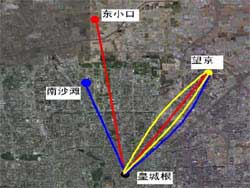| Posted: April 5, 2007 |
Chinese develop state-of-the-art quantum cryptography network |
|
(Nanowerk News) China's first computer network in which communications are secured with quantum cryptography has been successfully tested in Beijing. This was announced at the press conference held by the University of Science and Technology of China (USTC) on 2 April in Beijing.
|
|
Using "quantum routers" they have developed independently, a research team led by Prof. Guo Guang-can from the CAS Key Laboratory of Quantum Information at USTC has been successful in running secure data transmission among four users guaranteed by quantum cryptography on a commercial network operated by Beijing Branch of China Netcom Group.
|
 |
|
The experiment was made in March, with the maximum and minimum distances between the nodes in the network being 32 and 42.6 kilometers, respectively. The researchers performed the quantum key distribution either between one and the other three users or between any two of them. Based on error correction and security amplify of original keys, they also completed the multi-media communications protected by the quantum cryptography.
|
|
Current cryptography faces challenges from quantum computers, according to experts, because theoretically all codes can be deciphered. But quantum state cannot be copied and any interception of quantum state is easily discovered, Guo said, adding that the new quantum cryptography is therefore "absolutely safe" and proof against eavesdropping.
|
|
It is the only quantum network that could make simultaneous and two-way communications without any trusted relays ever reported in the world, according to experts. The feat is not only a crucial step towards the practical usage of quantum cryptography, but also laying foundation for the development of quantum Internet.
|
|
The research group successfully completed a 125-km fiber point-to-point quantum key distribution experiment between Beijing and Tianjin in 2004, which solved the problem of stability in practical long distance quantum cryptography systems.
China's first computer network in which communications are secured with quantum cryptography has been successfully tested in Beijing. This was announced at the press conference held by the University of Science and Technology of China (USTC) on 2 April in Beijing.
|
|
Using "quantum routers" they have developed independently, a research team led by Prof. Guo Guang-can from the CAS Key Laboratory of Quantum Information at USTC has been successful in running secure data transmission among four users guaranteed by quantum cryptography on a commercial network operated by Beijing Branch of China Netcom Group.
|
|
The experiment was made in March, with the maximum and minimum distances between the nodes in the network being 32 and 42.6 kilometers, respectively. The researchers performed the quantum key distribution either between one and the other three users or between any two of them. Based on error correction and security amplify of original keys, they also completed the multi-media communications protected by the quantum cryptography.
|
|
Current cryptography faces challenges from quantum computers, according to experts, because theoretically all codes can be deciphered. But quantum state cannot be copied and any interception of quantum state is easily discovered, Guo said, adding that the new quantum cryptography is therefore "absolutely safe" and proof against eavesdropping.
|
|
It is the only quantum network that could make simultaneous and two-way communications without any trusted relays ever reported in the world, according to experts. The feat is not only a crucial step towards the practical usage of quantum cryptography, but also laying foundation for the development of quantum Internet.
|
|
The research group successfully completed a 125-km fiber point-to-point quantum key distribution experiment between Beijing and Tianjin in 2004, which solved the problem of stability in practical long distance quantum cryptography systems.
|

